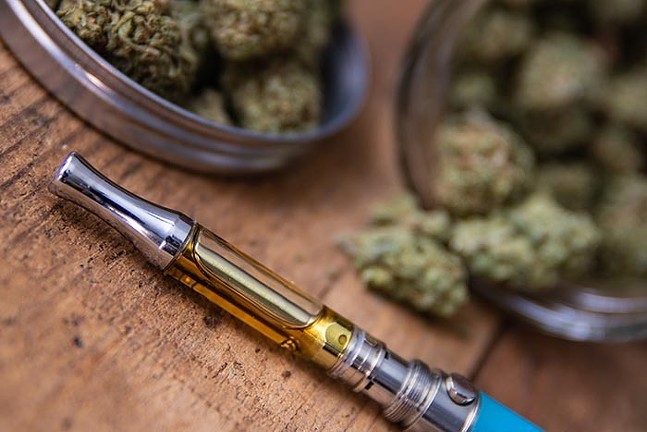Pa. review of medical cannabis vape products confuses and worries patients
An abruptly announced “review” of medical marijuana vape products by the Pennsylvania health department has medical marijuana patients wondering whether their medication is safe to use, and why state officials chose now to examine products that have been previously approved.
On Dec. 1, the Pennsylvania Department of Health sent an email to medical marijuana patients in the commonwealth, alerting them it was conducting a “state-wide review” of vape cannabis products with “added ingredients.” The email warns such products “may not be safe for inhalation," and adds that if it finds products with added ingredients are unsafe, the products will be removed from the market. “If you have any questions or concerns about products, you should consult with your medical professional,” the letter concludes.
But since that email, there has been no further follow-up on what prompted the review in the first place, leaving patients wondering what to do with products they have.
The email to patients was preceded by a Nov. 16 letter to growers and processors of medical marijuana in Pennsylvania, asking them to submit all vaporized cannabis products with additional ingredients for review – including products that had already been approved by the state. Any products not submitted for review would be recalled, the letter said, and any growers or processors who sold a product the state had recalled could face penalties including suspension of all sales of an operator’s vaporized products. The letter gave operators until Nov. 30 to comply with the order.
The health department did not reply to a request for comment from City Paper.
Meredith Buettner, executive director of the Pennsylvania Cannabis Coalition, a nonprofit organization that represents medical marijuana permit holders, says that patients in Pennsylvania’s medical marijuana program have been asking for ingredient disclosures since the program started. But instead of using its regulatory authority to compel operators to disclose their ingredients, the state has effectively put the onus on patients to find out what’s in their medication.
Buettner also notes that the Dec. 1 email to patients was sent at 11:12 p.m., from an email address that is rarely used to contact patients except to renew their ID cards. “It was unprecedented, and scared a lot of people,” she said. She added that her organization has thus far been unable to get any additional information about the review from the state.
According to the trade publication MJBizDaily, the state wrote in the email that it would conduct its review “as expeditiously as possible," and that the email indicated regulators are looking closely at externally sourced flavorings or terpenes.
Terpenes are naturally occurring compounds that give plants their scents, and some growers of cannabis vape products add synthetic terpenes, usually to enhance a particular strain’s natural flavor. Some growers add food-grade terpenes, but most are botanical, Buettner said. The products that Pennsylvania is scrutinizing at the moment are used in other cannabis markets across the country, she notes,
Patrick Nightingale, an attorney in Pittsburgh and director of cannabis advocacy group Pittsburgh NORML, also questioned what prompted the sudden review by the state, adding that as far as he was aware, the patient community – which includes more than 630,000 people statewide – is not aware of an incident that would call into question the safety of any vape cartridge products.
He added that patients are now wondering if they’ve been using unsafe products. He also questioned whether there was some “partisan fuckery” at play.
“Does this foreshadow DOH requiring additional product testing for other products?” he wrote in an email to City Paper. Pennsylvania’s medical marijuana products are quite expensive, he added, especially for a medical program, and he worries about any effect on costs that could potentially come out of this vape product review. “License holders will necessarily incur additional expenses complying with this requirement that will then be passed on to the patient. And it will be expensive for license holders to change product lines at the drop of a hat.”
On Dec. 1, the Pennsylvania Department of Health sent an email to medical marijuana patients in the commonwealth, alerting them it was conducting a “state-wide review” of vape cannabis products with “added ingredients.” The email warns such products “may not be safe for inhalation," and adds that if it finds products with added ingredients are unsafe, the products will be removed from the market. “If you have any questions or concerns about products, you should consult with your medical professional,” the letter concludes.
But since that email, there has been no further follow-up on what prompted the review in the first place, leaving patients wondering what to do with products they have.
The email to patients was preceded by a Nov. 16 letter to growers and processors of medical marijuana in Pennsylvania, asking them to submit all vaporized cannabis products with additional ingredients for review – including products that had already been approved by the state. Any products not submitted for review would be recalled, the letter said, and any growers or processors who sold a product the state had recalled could face penalties including suspension of all sales of an operator’s vaporized products. The letter gave operators until Nov. 30 to comply with the order.
The health department did not reply to a request for comment from City Paper.
Meredith Buettner, executive director of the Pennsylvania Cannabis Coalition, a nonprofit organization that represents medical marijuana permit holders, says that patients in Pennsylvania’s medical marijuana program have been asking for ingredient disclosures since the program started. But instead of using its regulatory authority to compel operators to disclose their ingredients, the state has effectively put the onus on patients to find out what’s in their medication.
Buettner also notes that the Dec. 1 email to patients was sent at 11:12 p.m., from an email address that is rarely used to contact patients except to renew their ID cards. “It was unprecedented, and scared a lot of people,” she said. She added that her organization has thus far been unable to get any additional information about the review from the state.
According to the trade publication MJBizDaily, the state wrote in the email that it would conduct its review “as expeditiously as possible," and that the email indicated regulators are looking closely at externally sourced flavorings or terpenes.
Terpenes are naturally occurring compounds that give plants their scents, and some growers of cannabis vape products add synthetic terpenes, usually to enhance a particular strain’s natural flavor. Some growers add food-grade terpenes, but most are botanical, Buettner said. The products that Pennsylvania is scrutinizing at the moment are used in other cannabis markets across the country, she notes,
Patrick Nightingale, an attorney in Pittsburgh and director of cannabis advocacy group Pittsburgh NORML, also questioned what prompted the sudden review by the state, adding that as far as he was aware, the patient community – which includes more than 630,000 people statewide – is not aware of an incident that would call into question the safety of any vape cartridge products.
He added that patients are now wondering if they’ve been using unsafe products. He also questioned whether there was some “partisan fuckery” at play.
“Does this foreshadow DOH requiring additional product testing for other products?” he wrote in an email to City Paper. Pennsylvania’s medical marijuana products are quite expensive, he added, especially for a medical program, and he worries about any effect on costs that could potentially come out of this vape product review. “License holders will necessarily incur additional expenses complying with this requirement that will then be passed on to the patient. And it will be expensive for license holders to change product lines at the drop of a hat.”



















